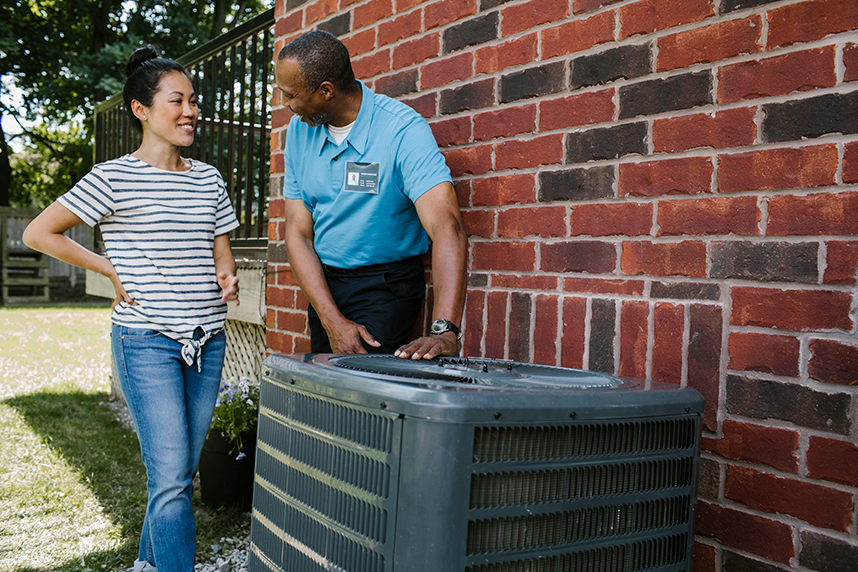
Buying Guide: Energy-efficient dishwashers
Save loads of time and energy with a dishwasher upgrade.
With more of us working from home these days, the dishes can certainly pile up. Having an energy-efficient dishwasher is a great way to save time during the day and keep your household running smooth, even if the whole family’s at home.
Whether you’re looking to replace your old dishwasher or get one for the first time, there’s no question that an energy-efficient model can be a huge boost to your lifestyle, without boosting your energy bills. Here’s what to think about when searching for a new dishwasher.
Look out for labels
If you’re buying a new dishwasher, the good news is that you really can’t go wrong in terms of energy efficiency. Dishwashers in Canada are all subject to the government’s Energy Efficiency Regulations, so they all meet minimum performance standards.
Most dishwashers available in the marketplace now have special sensors to test how dirty dishes are throughout the wash, so they can adjust the cycle accordingly, using less water and energy. They also have more efficient jets that use less energy when they spray detergent and water.
New dishwashers also benefit from improved water filtration that removes food, which is why you can skip the pre-rinse and still get sparkling dishes (more on that later). Some models even have internal water heaters, which can get your dishes cleaner without making your home’s water heater work harder.
While today’s dishwashers are definitely energy efficient, some are more so than others. The easiest way to check the energy efficiency of a dishwasher is to look out for the ENERGY STAR label. Standard and compact dishwasher models that have earned this label – based on their energy use and water consumption – are 12 per cent more energy efficient than standard ones and use up to 30 per cent less water. Those models with the ENERGY STAR Most Efficient label are the best in terms of efficiency.
You can also check out the EnerGuide label. These mandatory labels on appliances tell you the model’s energy consumption per year (measured in kilowatt hours), and more importantly, how it stacks up against other models.
Why dishwashers beat hand washing
When it comes to using an energy-efficient dishwasher versus hand washing, it’s no contest. Most dishwashers use less than 15 litres in the entire cycle, while hand washing uses roughly 15 litres every two minutes. ENERGY STAR dishwashers could save you 26,400 litres of water a year. To put that into perspective, that’s 87 standard bathtubs full of water.
Since heating water is a big contributor to a households’ energy use, the less hot water you use, the better. This can translate into savings of more than $100 per year on your utility bills.
If the energy and cost savings don’t convince you, consider that by using a dishwasher you could save yourself over 230 hours at the sink over the course of a year. That’s almost 10 days!
Use your settings – and adapt your habits
Dishwasher technology (and detergents) have improved dramatically over the past several years – but for some of us, our habits need to catch up too. Here’s what to look for and do at home to get the most out of your dishwasher.

Consider size: Compact dishwasher models usually hold up to eight place settings and six serving pieces, while standard models can hold more than that. Consider the size of your household and how often you think you’ll run your dishwasher. Keep in mind that running a compact model more often can end up using more energy than choosing a standard model and using it a little less often.

Choose – and use – the right settings: When looking for a dishwasher, look for a model with multiple setting options. Many models offer different settings depending on how dirty the dishes are. They also offer options such as no-heat air drying which can help save even more energy. Keep an eye out for other features, like rack designs that are adjustable and may let you use your dishwasher for larger items. Be sure to read over your manual to get the most out of your dishwasher’s settings.

Go all in: Chances are, most of your household dishes and cookware items are dishwasher safe, but it never hurts to double check before tossing them in (gently, of course). Avoid putting wood, cast iron, insulated mugs or delicate materials, such as china or crystal, in the dishwasher to ensure they keep their overall shape or coatings. When it comes to pots and pans, handwashing can actually use up more water and water heating. Lastly, running a full load makes the most sense, you’ll save more on energy and costs.

Skip the sink: With today’s dishwashers and detergents, pre-rinsing dishes isn’t necessary, it’s time-consuming and costly. Your dishwasher can do the heavy lifting, load them right in and let it scrape food from dishes. Using a rinse agent in your dishwasher can also help get your dishes even cleaner.
Whatever model you go for, choosing an energy-efficient dishwasher will be a move you won’t regret. With the right model, you can keep your energy bills in check and save more time for the things that matter most to you.



